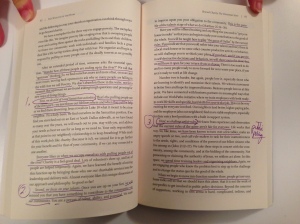It’s Christmas season. Every favorite Christmas movie we see, every touching story we hear, every news segment on a food pantry or a toy drive, reminds us that there are some with plenty and some without such plenty.
So, it’s a time to give. But, maybe it’s also a time to reflect; personally, deeply…
I read books for a living. I present synopses/briefings, and do all sorts of leadership training sessions built around the useful content of the best business books I have read.
 But I also make similar presentations, focusing on books dealing with issues of social justice, each month for a nonprofit, CitySquare. And of all the books I have ever presented, only a couple have been written by people I knew. And one is written by a friend – Larry James, the CEO of CitySquare.
But I also make similar presentations, focusing on books dealing with issues of social justice, each month for a nonprofit, CitySquare. And of all the books I have ever presented, only a couple have been written by people I knew. And one is written by a friend – Larry James, the CEO of CitySquare.
As I was re-reading my handout for his terrific and convicting book, The Wealth of the Poor, this is the line that jumped out at me. From the book:
I’d been schooled by my environment and the people I trusted to believe that black people were not like me at all. This was undoubtedly the most significant and crippling lie of my childhood. …I had been lied to…
Yes, the book has plenty of other thoughts/reminders worth reading. For example:
In truth, the question must never be, “Who is my neighbor?” Rather, the proper, the real question is, “How can I be a neighbor to anyone in the world?”
But it is that “lie” quote that got me in this re-read: the most significant and crippling lie of my childhood. I suspect that it is a lie that is told far past anyone’s childhood.
And it is a lie that is true about other “groups” also. The poor; Hispanics; Muslims… And all of the “the other” groups that we view as and treat as “the other.”
Do we simply have trouble believing that they are human beings in the same way as we are?
The most soaring rhetoric reminds us that all — we all; all human beings all — share this planet, and need to do our best to include the “all” in our thinking, in our actions, in our help-giving. Here’s John Kennedy, with maybe his greatest paragraph of all (and he has quite a few to choose from. American University, 1963):
So let us not be blind to our differences, but let us also direct attention to our common interests and the means by which those differences can be resolved. And if we cannot end now our differences, at least we can help make the world safe for diversity. For, in the final analysis, our most basic common link is that we all inhabit this small planet. We all breathe the same air. We all cherish our children’s futures. And we are all mortal.
“They” – those “the other” folks – they are not so different, and maybe, given the same kind of upbringing and opportunity and help and challenge we would all be more alike than we realize.
Larry James has spent a life-time trying to be a neighbor in small ways, and in some big ways. The subtitle of his book puts his philosophy front-and-center: How Valuing Every Neighbor Restores Hope in our Cities.
It’s Christmas. Restoring hope is kind of the job description for Christmas celebrators one-and-all, isn’t it?
——————–
Order Larry’s book, The Wealth of the Poor, today. Read it. It really is worth reading. It might help you remember the basics of the basics.
And here’s my review of his book: The Wealth of the Poor by Larry James – A Book Review by Randy Mayeux.

